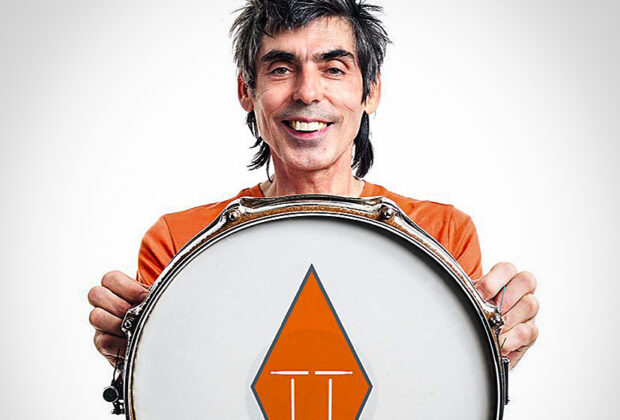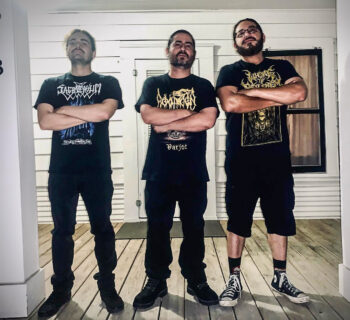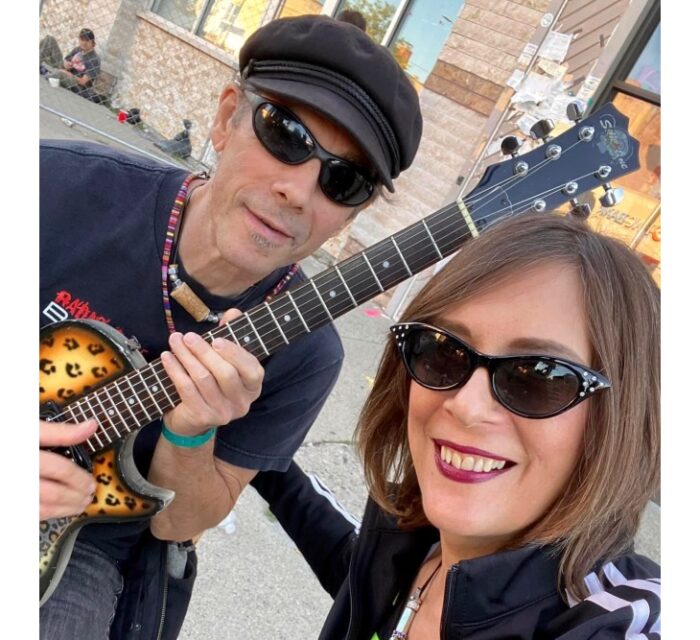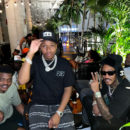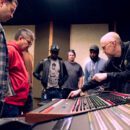Who among us hasn’t spent at least a few minutes during a concert wondering what goes on in the mind of the drummer, the wooden stick-wielder who holds the show together, the acting director who is, ironically, usually mute throughout the performance? It could be a speed-freak like Keith Moon. A booze-drenched beast like John Bonham. Rumor has it that some drummers are even prone to self-combustion. Or it could be a polite, kind, empathetic man whose generosity toward others is even more profound than his drumming abilities.
The man in question is Todd Trainer, the criminally underrated drummer of dyed-in-the-wool independent-rock power trio Shellac, whose frontman, famed engineer Steve Albini, died last spring. Albini and bassist Bob Weston were essentially the faces of the band, even though the stylish Trainer got plenty of attention with his masterful, intensely physical—and physically demanding—performances behind the drum kit.
“My reputation, which preceded me, was that I was this intimidating or imposing figure onstage,” Trainer said. “I can be really approachable.”
Following Albini’s death, Shellac dissolved, leaving some to wonder what Trainer—he too of Touch and Go Records mainstays Brick Layer Cake—would do next. As it turns out, he’s devoting even more time to an endeavor that is more noble and altruistic than you would probably assume: teaching kids how to play the drums.
“I’ve been doing the touring-band thing in Shellac for the last 33 years,” Trainer said. “I certainly miss it. There's a massive void there, which I still haven't managed to fill… But I do love having kid students. Any age group is good for me. Nothing is as satisfying as having someone come in, in the middle of their life going, ‘Playing drums is something I've always wanted to do and never done.’”
Trainer established his drumming practice, so to speak, 11 years ago in his Minneapolis hometown. Back then, his operation consisted solely of him providing drum lessons “by delivery,” which is to say meeting his students where they are rather than renting a space.
“In the early days of all of my previous bands [which also include Breaking Circus and Rifle Sport], we promoted ourselves by putting flyers up in record stores and coffee shops and telephone poles,” Trainer remembered. He used the same strategy to bring awareness to what he eventually named Todd Trainer Drumming Instruction. Hey, if DIY made Shellac a success, why wouldn’t it work again?
And it did. A year after Trainer launched his effort, he secured a rehearsal space and a troop of kids excited to bang on circular objects. With a big assist from his wife, a graphic designer, they taught themselves how to manage scheduling, accounting, billing, a website, and all the other bells and whistles that even a small company must have.
After a brief stint teaching drumming lessons at a school in the Twin Cities area, Trainer went fully independent eight years ago. And we all know what happened a few years after that.
“Technology had become critical to my business when the pandemic hit, at which point Shellac was on tour,” he recalled. “My studio was closed for a couple of weeks anyway … my intention was to come back and pick up drum lessons where I had left off, wait it out. And then the band had to put all our plans on hold, and I was home and had nothing to do.”
It was then that the technologically—let’s say—wary Trainer went full bore on the Internet after years of reluctance (Shellac itself was a notoriously Luddite band, resisting digital music and even CDs).
“I look back at that time as very bittersweet, because [the COVID era] was awful for the majority of the world, myself included. However, it was a real boost to my business,” Trainer reflected. “I was able to get a lot of students online from around the country, even around the world. To this day, a healthy portion of my business is online students who aren't in the Twin Cities. It ended up being very beneficial to what I’m doing.”
Trainer doesn’t have any children of his own, but when he speaks about teaching kids how to play drums, his voice softens and rises in pitch.
“One exercise I do with them is a combination of drum beats, drum fills, all these things where I'm playing them together with a student,” he said. “It's a great way to challenge a student to see how well we can synchronize and stay in time with each other. I'll play a beat, we'll be playing together, and then I'll change it, and then have the student follow me, and then I'll add a drum fill, and have the student follow me, and I'll change the beat again, and change the fill again and play a little. It really is a little game. It's a lot of fun. Students love it.”
Clearly, so does Trainer. He was always hard to read behind the kit at Shellac concerts, looking like a male runway model flailing his thin appendages as if outlining unusual shapes in the air and over his drum set. He was always very sweaty, looking beat to exhaustion from the rigors of adhering to the incredibly demanding drum riffs he himself had written.
Todd Trainer the drum trainer hasn’t lost his cool, or his chic style, but when he talks about teaching kids how to improve not only their drumming skills but their sense of self-worth and self-confidence, Trainer beams.
“Playing a drum kit full volume is really exciting and exhilarating, very fulfilling in so many respects,” he explained. “But in that situation, you're not trying to communicate to an individual. You're communicating to an audience. During drum lessons, I’m trying to have a dialogue back and forth.”
He added: “Half of my student base have no idea what Shellac is. They have no idea that I have a musical history outside of drum lessons. I'm just their drum teacher.”

